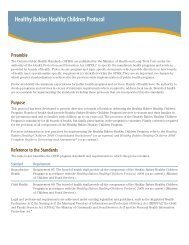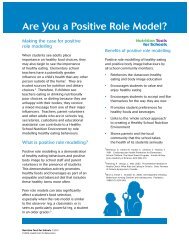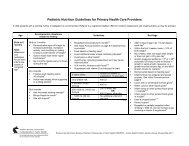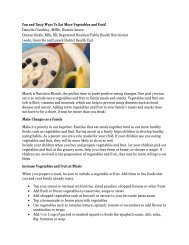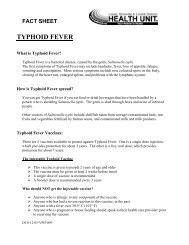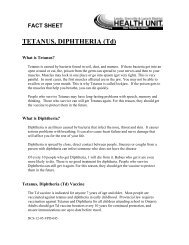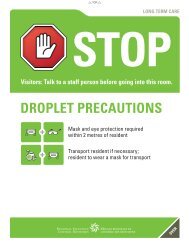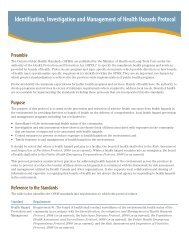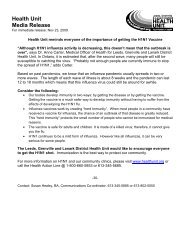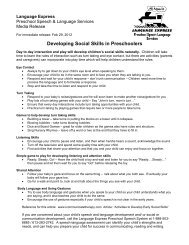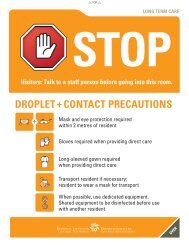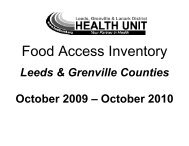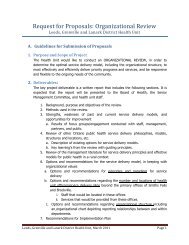Red Flags â - Leeds, Grenville and Lanark District Health Unit
Red Flags â - Leeds, Grenville and Lanark District Health Unit
Red Flags â - Leeds, Grenville and Lanark District Health Unit
You also want an ePaper? Increase the reach of your titles
YUMPU automatically turns print PDFs into web optimized ePapers that Google loves.
GROWTH & DEVELOPMENT<br />
SOCIAL/EMOTIONAL<br />
Problem signs ...<br />
if a child is experiencing any of the following, consider this a red flag:<br />
0-8 months<br />
□□ Failure to thrive with no medical reason<br />
□□ Parent/guardian <strong>and</strong> child do not engage<br />
in smiling <strong>and</strong> vocalization with each other<br />
□□ Parent/guardian ignores, punishes or<br />
misreads child’s signals of distress<br />
□□ Parent/guardian pulls away from infant or<br />
holds infant away from body with stiff arms<br />
□□ Parent/guardian is overly intrusive when<br />
child is not wanting contact<br />
□□ Child is not comforted by physical contact<br />
with parent<br />
8-18 months<br />
□□ Parent/guardian <strong>and</strong> child do not engage<br />
in playful, intimate interactions with each<br />
other<br />
□□ Parent/guardian ignores or misreads child’s<br />
cues for contact when distressed<br />
□□ Child does not seek proximity to parent<br />
when distressed<br />
□□ Child shows little wariness towards a new<br />
room or stranger<br />
□□ Child ignores, avoids or is hostile with<br />
parent after separation<br />
□□ Child does not move away from parent to<br />
explore, while using parent as a secure base<br />
□□ Parent/guardian has inappropriate<br />
expectations of the child for age<br />
18 months - 3 years<br />
□□ Child <strong>and</strong> parent have little or no playful or<br />
verbal interaction<br />
□□ Child initiates overly friendly or affectionate<br />
interactions with strangers<br />
□□ Child ignores, avoids or is hostile with<br />
parent/guardian when distressed or after<br />
separation<br />
□□ Child is excessively distressed by<br />
separation from parent<br />
□□ Child freezes or moves toward parent<br />
by approaching sideways, backwards or<br />
circuitously<br />
□□ Child alternates between being hostile<br />
<strong>and</strong> overly affectionate with parent<br />
□□ Parent/guardian seems to ignore,<br />
punish or misunderst<strong>and</strong> emotional<br />
communication of child<br />
□□ Parent/guardian uses inappropriate<br />
behaviour management techniques<br />
3-5 years<br />
□□ Child ignores adult or becomes worse<br />
when given positive feedback<br />
□□ Child is excessively clingy or attention<br />
seeking with adults, or refuses to speak<br />
□□ Child is hyper vigilant or aggressive<br />
without provocation<br />
□□ Child does not seek adult comfort when<br />
hurt, or show empathy when peers are<br />
distressed<br />
□□ Child’s play repeatedly portrays abuse,<br />
family violence or explicit sexual<br />
behaviour<br />
□□ Child can rarely be settled from temper<br />
tantrums within 5-10 minutes<br />
□□ Child cannot become engaged in selfdirected<br />
play<br />
□□ Child is threatening, dominating,<br />
humiliating, reassuring or sexually<br />
intrusive with adult<br />
□□ Parent/guardian uses inappropriate<br />
behaviour management techniques<br />
WHERE TO GO FOR HELP<br />
See Social/Emotional in the Where to Go for Help section at the back of this document.<br />
20 <strong>Red</strong> <strong>Flags</strong>: Early Identification in <strong>Leeds</strong>, <strong>Grenville</strong> & <strong>Lanark</strong> November 2007



